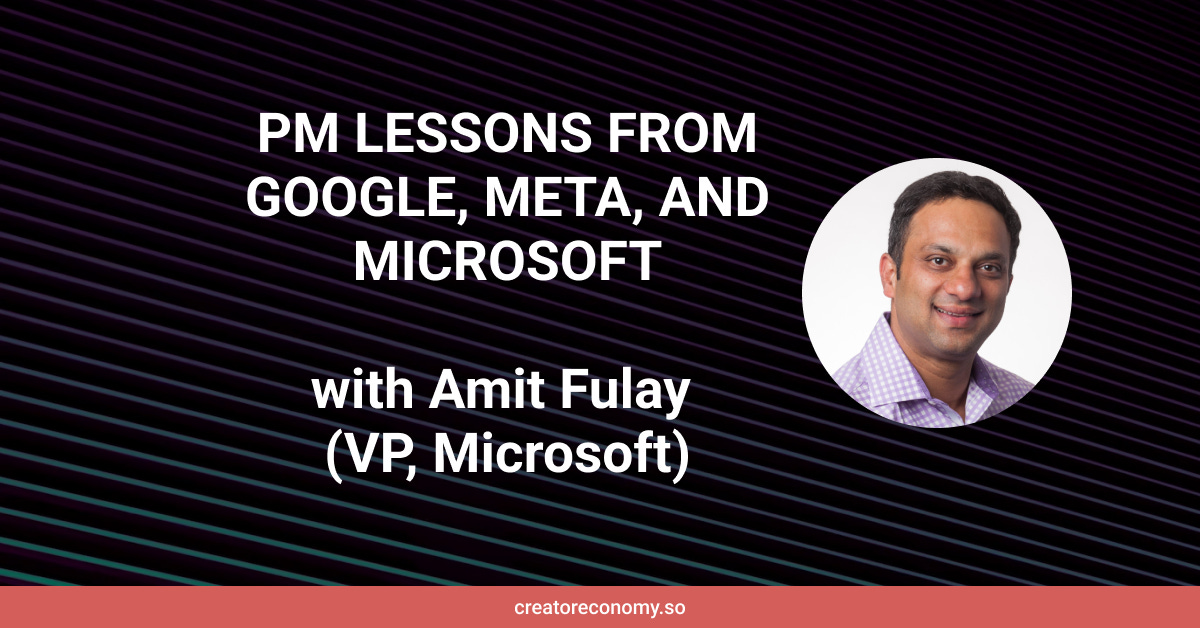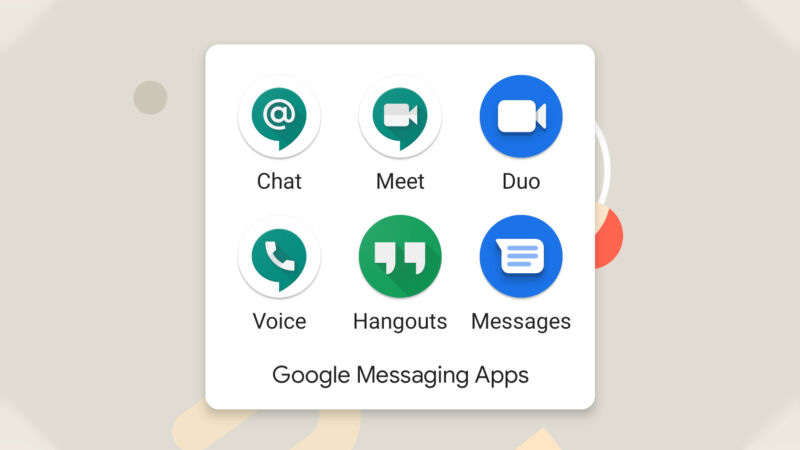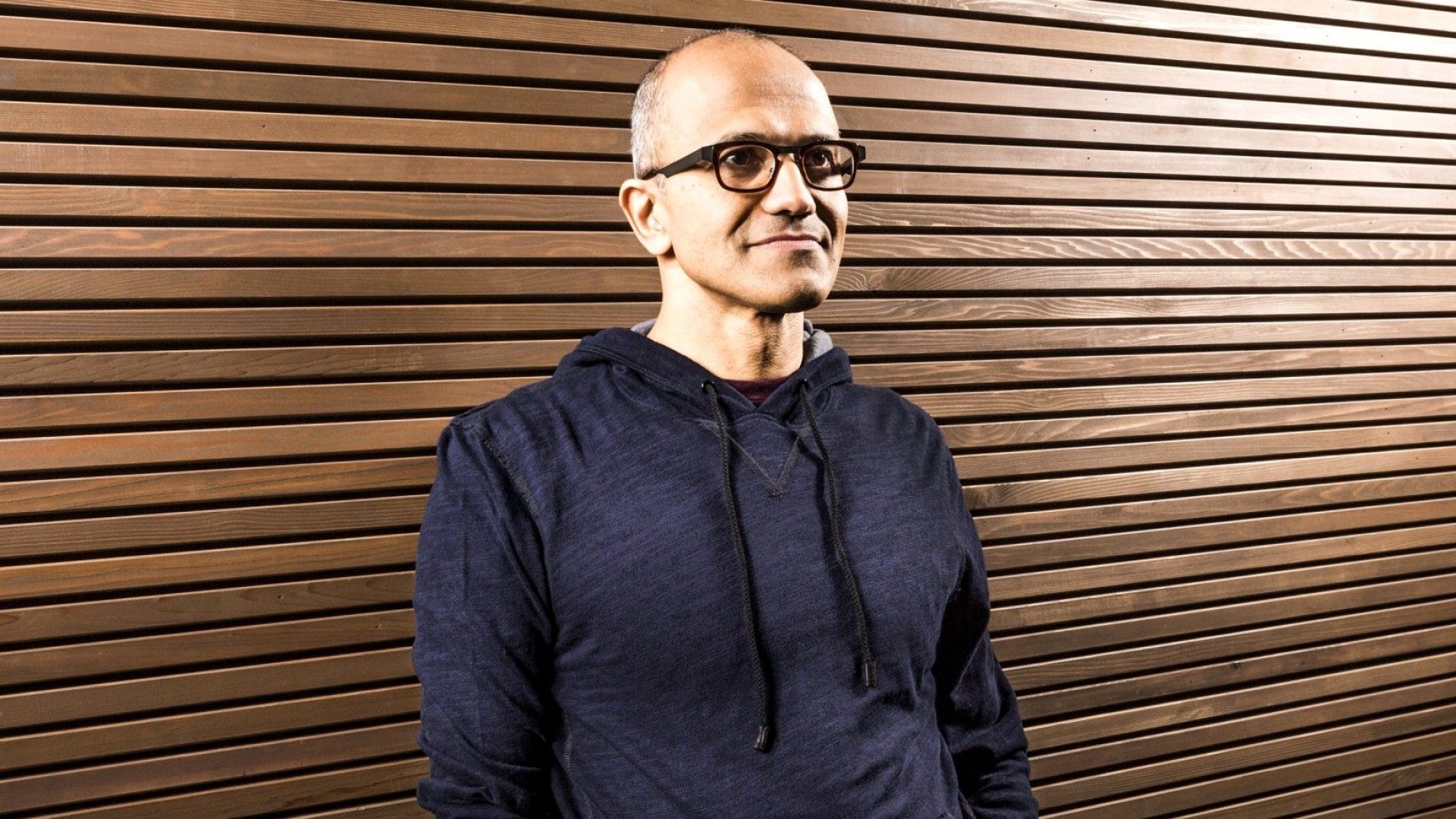Amit Fulay (VP, Microsoft): PM Lessons from Google, Meta, and Microsoft
Amit Fulay (VP, Microsoft): PM Lessons from Google, Meta, and MicrosoftA candid conversation about Google's confusing messaging strategy, Satya Nadella's superpower, and the ups and downs of PM careersDear subscribers, Amit Fulay is VP Product for Microsoft Teams and previously spent a decade building products at Meta and Google. I spoke to Amit about:
Amit has built products at three of the most dominant tech companies of our time. He was also incredibly honest with me about his own mistakes and setbacks. Check out the abridged interview transcript below. Amit’s path from PM to VPWelcome Amit! I’d love to start with your time at Google. You spent 7 years there and grew from PM to group PM. What did you learn from that experience? When I look back on my Google journey, there are a few things that stand out:
Let’s talk about Google’s messaging products. Google has taken a winding path in their messaging strategy - launching and deprecating multiple products (e.g., Hangouts, Allo, Chat). Why do you think this happened? I can write a book on this topic because I had a front row seat to some of it. I think we got two things wrong:
Let me give you two examples:
I see similar patterns with Google’s messaging strategy today. For example, Google is bringing Meet and Duo together in Workspace. That may be a great idea, but it’s also chasing the success of Zoom and Microsoft Teams. Chasing competitors blindly doesn’t work. You have to define a few key areas where you’ll solve a user’s problem better than anyone else. At Meta, you led News Feed, which is certainly not a 0-1 product. What did you learn from that experience? I think Meta is really good at a few things:
It took you a decade to grow from PM to VP. But as you wrote recently, careers are full of ups and downs. Can you share a time when you felt frustrated in your career? When we experience a setback, we assume that it’s only happening to us. Nobody shares these setbacks publicly, so it’s easy to assume that you’re the only person who’s getting left behind by a reorg, layoff, or skipped promotion. But the truth is, all of us go through these setbacks. I’ll give you an example: At Google, I got really good at building 0-1 products, but I also got feedback that I wasn’t experienced at building products and teams at scale. At that time, I thought that this was a huge setback because I put so much effort into building these new products in this massive company. But you know, a more constructive way to look at the feedback was, “Ok, I’m going to get that scaled experience. I’m going to learn the truth about why this experience matters.” So that’s why I took a job to manage the most scaled product out there - the Facebook News Feed with 2B users. Working on News Feed taught me how to make decisions when every pixel had massive trade-offs for billions of people. I was able to turn my setback into an opportunity to build a new skillset. I think everyone can do this if they can reframe their situation. Managing your PM careerAlong the same lines, you wrote that sometimes people have to take a step back (e.g., smaller role, company, or compensation) to catapult to better opportunities. Can you explain how this might work? Yes, let me give you another example. Early in my career, I went from Microsoft to a really small startup that only had seven employees. People thought I was crazy, but that startup turned out to be one of the best places for me to grow. Because the startup was rapidly expanding, I got to grow my responsibilities and scope much faster than if I stayed at Microsoft. Even today, when I mentor other PMs, some of them will look at opportunities and say: “My comp is going to be less” or “My title will be lower” or “My team will be smaller.” But sometimes it’s worth making these trade-offs for the right opportunity. That’s what I mean by catapult. You have to choose your bets carefully, but often you can get on a faster growth trajectory by taking a step back. At a large company, success often comes down to whether you’ve built trust and relationships with your manager and the leadership team. Do you have any advice on how to do this? Totally. I have three suggestions:
I think one caveat is you don’t want to be too negative even if you’re being honest. You’re so right. If you’re always bringing problems instead of solutions, that’s not great either. But you can be honest even if you’re struggling with something. You can say, here’s the challenge we’re dealing with or here’s the solution that we tried and why it didn’t work. Just having that honesty goes a long way. What advice do you have for people who feel career angst? This angst could come from a goal to get promoted in a certain timeframe, a feeling that they’re not being recognized, or a sense that their colleagues are getting ahead. I think it’s a human thing to feel angst about our careers. So don’t be too hard on yourself. Instead, be aware of what’s creating your angst so that you can deal with it. I see a few common sources of angst:
When you feel career angst, seek to understand what triggers it and then to find ways to deal with it. This is an important skill that everyone should work on for their happiness. I think people should also be open to serendipity. If you’re only focused on being a director by age 35, you might make a bad decision to become a director at the wrong company. Yes this is the classic fixed vs. growth mindset. If you have a fixed plan, then you’re shutting out all the other opportunities that might come along the way. Sometimes I feel like the best career plan is to not have one. Instead of asking, “Where do I want to be 5 years from now?” I find it useful to think:
I think just having that lens opens you up to so many more opportunities. Yeah it’s kind of like building a product strategy. I mean how many 10 year strategies actually work out exactly as planned. Yeah. These days I just want to go along with the journey and see where it takes me. Microsoft’s cultureI’d like to wrap up by talking about Microsoft. You and I both worked at Microsoft over a decade ago. I’ll be honest with you - I sold all my stock when I left because I thought the company was done. But Microsoft has really transformed under Satya. How do you think the company has changed since a decade ago? Yeah I also sold all my stock when I left! 13 years later I’m back and it’s definitely a different company. If I can sum it up in one line - Microsoft no longer has hubris.
It’s honestly remarkable how Satya was able to change the culture of this company. It’s hard enough to change culture for a small team, nevermind hundreds of thousands of people. Do you have a personal story to share about Satya? You know I’ll call out one experience that shows how he operates. I don’t think I’ve ever shared this before but here it is. A few weeks after I joined Microsoft, Satya randomly called me and my manager to chat. During those 30 minutes, he only asked questions. He asked about our thoughts on the product strategy, Microsoft’s culture, and what we thought needed change. Here you have this CEO of a $2 trillion company just listening to two new employees instead of telling us what to do. That’s remarkable. Later on, I realized that this is how Satya gathers signal. He’s really good at getting different points of view from different sources and then connecting the dots on what needs to be fixed. It’s remarkable that he can do this without falling into the temptation of telling you what to do or becoming defensive. Wow, that’s an amazing story, thanks so much for sharing it! Let’s close by talking about how Microsoft is integrating AI. You’re a VP in the Microsoft Teams org, which just announced AI-powered meeting notes, timeline markers, and translations. Tell me more about the level of energy in company about AI. Is this the big new charter for the company? Yes! You’ve seen the recent announcements and there is a lot more to come. In Teams, we are thinking about how we can use AI capabilities to make collaboration easier and more productive. There are manual tasks like taking meeting notes that can be automated through AI. I can say that there’s a lot of excitement about AI across the company. Satya is definitely pushing us to do more and to do it faster. I can’t wait for hear about your future product announcements. Thanks Amit! If you enjoyed this post, follow Amit on LinkedIn. Creator Economy by Peter Yang is free today. But if you enjoyed this post, you can tell Creator Economy by Peter Yang that their writing is valuable by pledging a future subscription. You won't be charged unless they enable payments. |
Older messages
The Future of Search is Conversations
Friday, February 17, 2023
Microsoft, Google, and the race to make search feel more like talking to a trusted friend than navigating 10 blue links
Elena Verna (Head of Growth, Amplitude): The Journey From Growth Leader to Solopreneur
Wednesday, February 1, 2023
How you can apply growth frameworks to take power back in your career
How to Talk to Customers to Gather Useful Insights
Friday, January 20, 2023
Talk to customers about their problems, not about your product
Make 2023 Your Best Year Yet With This Ritual
Wednesday, January 4, 2023
Reflect on 2022 to set yourself up for success in 2023
2022 Year in Review: 10 Lessons From My Journey as a Creator and Product Leader
Wednesday, December 28, 2022
Creators and product leaders have more in common than you think
You Might Also Like
Lead, Don’t Feed
Tuesday, March 4, 2025
Depth > Frequency.
"What You’re Made For": Lessons from a Life Well Lived
Tuesday, March 4, 2025
We are not merely here to exist, survive, or drift along—we are here to truly live.
WTF is attribution modeling?
Tuesday, March 4, 2025
Despite signal loss and last-touch bias limiting its usefulness, marketers are still turning to attribution modeling to measure the impact of their ad spend. March 04, 2025 PRESENTED BY WTF is
🔔Opening Bell Daily: Stocks believe Trump now
Tuesday, March 4, 2025
The S&P 500 just had its worst day of 2025 as the president confirmed tariffs.
From 0 to $5B (local non-US market)
Tuesday, March 4, 2025
I love that you're part of my network. Let's make 2025 epic!! I appreciate you :) Today's hack From 0 to $5B (local non-US market) Nadiem Makarim is a guy who managed to create
Quiet quitting is out. Revenge quitting is in? 😜
Tuesday, March 4, 2025
Do it loud. Do it proud, I guess.
Building complete rank and rent sites in just minutes
Monday, March 3, 2025
This tool is incredible
🌁#90: Why AI’s Reasoning Tests Keep Failing Us
Monday, March 3, 2025
we discuss benchmark problems, such as benchmark saturation, and explore potential solutions. And as always, we offer a curated list of relevant news and important papers to keep you informed
I interviewed THE largest Amazon Seller [Roundup]
Monday, March 3, 2025
Need funding for your Canadian Amazon business? Not sure if you should use a Canadian corporation or US LLC to form your company? We'll cover these questions and more in our Start and Grow Your FBA
The state of data-driven decision-making for CPG brands
Monday, March 3, 2025
How marketers use purchase insights to maximize campaign performance



